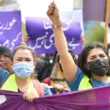The census exercise in Karachi has almost been completed, with data showing a 15% dip in the city’s population compared to six years ago. Despite the deadline for the exercise being extended twice, enumerators are still scrambling to reach many households. The population of Karachi was a contentious issue during the 2017 census, with political parties claiming that the final count was less than the actual number. This has led to the exercise being repeated within six years.
More than 2.64 million households have been counted so far, making up 89.93% of the exercise, according to a source with knowledge of the census data. With a little over 10% of the population left to be counted, the possibility of an increase in Karachi’s population appears slim. None of Karachi’s seven districts have registered an increase in population during the last five years. The chief census commissioner has expressed concerns over the role of the district administration, accusing assistant commissioners of not properly deploying enumerators or monitoring their jobs.
Despite the completion of almost 90% of the exercise, the data shouldn’t be relied upon to estimate the final count, said Dr Naeemuz Zafar, the chief census commissioner of the Pakistan Bureau of Statistics. Several areas, including high-rise residential settlements, have not yet been reached by enumerators, he added. The final number can only be determined after the exercise is fully completed.
The deadline for the fieldwork has been extended to April 14 due to the delay in data gathering. The chief census commissioner outlined challenges faced by his team in major urban centres, including a lack of interest from assistant commissioners, technical flaws in the software designed for the digital census, and citizens’ lack of faith in the government.
TAGS: Karachi census, population decrease, census data, census exercise, household counting, district administration, enumerators, Pakistan Bureau of Statistics, high-rise residential settlements, citizen’s faith, chief census commissioner, digital census, fieldwork deadline, urban centers, political parties, fresh disputes.








